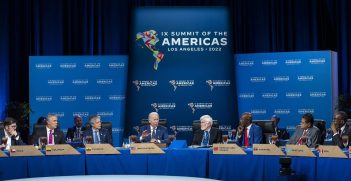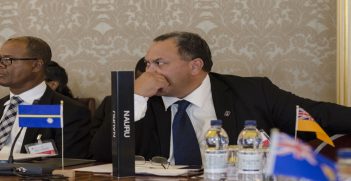Guatemala’s Turbulent Election

Guatemala’s elections demonstrate that democratic backsliding is on the march. While there is great energy for a new presidential candidate with plans to strengthen government and democratic accountability, establishment parties and candidates are unlikely to accommodate these demands.
In recent years, we have witnessed the erosion and even collapse of democracy across most Central American countries. Guatemala’s recent election highlights the country’s weakening rule of law and the power struggles between powerful factions. The significant efforts to fight corruption under the International Commission against Impunity in Guatemala (Comisión Internacional contra la Impunidad en Guatemala, CICIG) have been systematically dismantled under the last two government administrations. In recent years we’ve seen increased state pressure against journalists, civil society, and those involved in earlier CICIG investigations. This democratic backsliding affected Guatemala’s recent election. First, by weakening democratic and electoral institutions, ultimately marring the electoral process. Second, in a surprising turn of events, it catapulted a less well-known (and financed) candidate who campaigned on an anti-corruption platform to the second-round presidential election, pitting him against an establishment candidate associated with the anti-democratic blocs of power.
At stake in the 25 June general election were over 4,300 elected positions, including the president, all 160 congressional seats, local governments (340 mayors and 3,965 municipal representatives), and the 20 delegates for the Central American Parliament (Parlamento Centroamericano, PARLACEN). In many ways, this election followed patterns established after the restoration of democracy. Voters faced a plethora of choices, with 29 political parties registered with the Electoral Tribunal (Tribunal Supremo Electoral, TSE), of which 12 were new and 22 presented presidential candidates. As in previous elections, new parties did well, securing 37 percent of the vote, well above the country’s average (17.61 percent between 1985-2023). Electoral volatility remained high at 40.64 percent, just slightly below the country average of 41.52 percent (1985-2023). As in previous elections, the 2023 election was marked by personalistic appeals, high spending, and low voter turnout. The issues most discussed were security, the economy, and corruption. However, with few exceptions, discussions took place in general terms rather than clear policy proposals. Only some presidential candidates publicised a government plan and only some of those provided concrete ideas for voters to evaluate.
The reality of Guatemala’s weakly institutionalised party system is that holding politicians and parties accountable is difficult. Tracking candidates/parties is difficult, challenging even the most well-informed voter. In addition to this complex electoral scenario, the 2023 election was also marked by a series of controversial rulings that negatively set the election apart from previous ones and highlighted the extent to which the country’s democratic institutions have been weakened.
Among the problems were the selective application of electoral rules and the use of technicalities to sideline four candidates (Thelma Cabrera, Roberto Arzú, Oscar Rodolfo Castañeda, and Carlos Pineda). The last to be disqualified by the TSE, Pineda, was the frontrunner at the polls one month before the election. All four rulings gave all appearances of being political rather than impartial applications of the rule of law by TSE and the Constitutional Court. These decisions weakened trust in the electoral process and institutions in the lead-up to the election.
On election day, the dissatisfaction of Guatemalans with the electoral process was visible in at least three ways; first, with the low number of young voters who registered to vote. Second, the high percentage of citizens who cast null and blank ballots was 24.38 percent, higher than any of the 22 presidential candidates received. Third, with the low turnout, only 60 percent of the population exercised their right to vote.
At the presidential level, Sandra Torres with the National Unity of Hope party (UNE for its initials in Spanish) received the largest vote share (15.86 percent). It is Torres’ third bid for the presidency; she also secured a spot in the run-off election in her previous attempts. The surprising second-place winner was Bernardo Arévalo, with the progressive party Seed Movement (Movimiento Semilla). He secured 11.78 percent of the vote, campaigning mainly on an anti-corruption platform. Arévalo’s second place was surprising because polls had placed him well below the top three candidates. With no candidates securing a majority of votes, Guatemalans will vote in a run-off election on 20 August.
Yet another marked and troubling difference between this and previous elections is the instability of the post-election period. Powerful groups have sought to use the judicial system to remove Arévalo from the run-off election. A first attempt was made before the TSE certified the results. On 1 July, nine political parties, including the UNE, asked the Constitutional Court for a second count of the official acts, alleging fraud at the hands of Semilla’s representatives. With no significant changes to the results after the TSE reviewed the questioned acts, the country’s Supreme Court recognised the legality of the electoral process, and the TSE certified the results on 12 July.
The same day that the challenge to the votes was resolved, the government, through officials in the Special Prosecutor Against Impunity (Fiscalía Especial Contra la Impunidad, Feci) and the prosecutor’s office (Ministerio Público, MP) instigated a second attempt to remove Semilla by canceling the party, citing inconsistencies and alleging corruption in the party’s registration process. The TSE has fought against these moves, arguing that it alone has authority over the matter, in addition to citing Guatemala’s electoral law, which states that once an electoral process has started, political parties cannot be suspended. Overall, the public has moved to support Semilla’s right to participate in the run-off election and has rallied in support of the TSE and its decisions in the post-election period.
Since the first allegations on 12 July, the MP and Feci have continued to harass Semilla. As with previous rulings in the election cycle, moves by the Feci and MP highlight the lack of judicial independence and respect for the rule of law. It is unclear when or whether the government will step back from its position on the legality of Semilla and its candidate and give Guatemalans a chance to focus on the run-off election.
Regardless of who wins the presidential election, governing will continue to be challenging in Guatemala. The country’s constitutional design means presidents have few institutional powers and require a working majority in Congress. The results of the June election left Guatemala’s legislature highly fractionalised, as was the case in previous elections. The country’s 160 congressional seats will be divided across 20 parties, with the outgoing president’s party (VAMOS) holding a majority with 39 seats, while UNE has 28 and Semilla 23.
Overall, Guatemala’s 2023 election highlighted the democratic backsliding that has taken place in the country; the process is marked by irregularities that have furthered weakened democracy. At this moment, the uncertainty of which candidates will participate in the run-off appears to have been resolved; however, Semilla continues to deal with attacks from the current government.
Who will win the run-off election is unclear. The two choices are stark and represent two very different roads for Guatemalans. On the one hand, Torres and her party represent the status quo, one where democratic backsliding, including corruption, the harassment of human rights and environmental organisations, as well as journalists, seem the most likely outcome. On the other hand, Arévalo and Semilla promise to move Guatemala back toward a democratic path, focusing on continuing the fight against corruption and respect for the rule of law. The latter is the more arduous path. Given the entrenched blocs of power, enacting fundamental political change in the country will be challenging. Still, the hope that Semilla brings is a reminder of the 2015 mobilisation of civil society and the then widespread support for substantial political change. In a region plagued with the erosion of democracy, Guatemala could serve as an example of what is possible when citizens choose a democratic path.
Annabella España-Nájera is Professor at California State’s University, Fresno. She studies democracy and democratic institutions in Central America.
This article is published under a Creative Commons License and may be republished with attribution.




